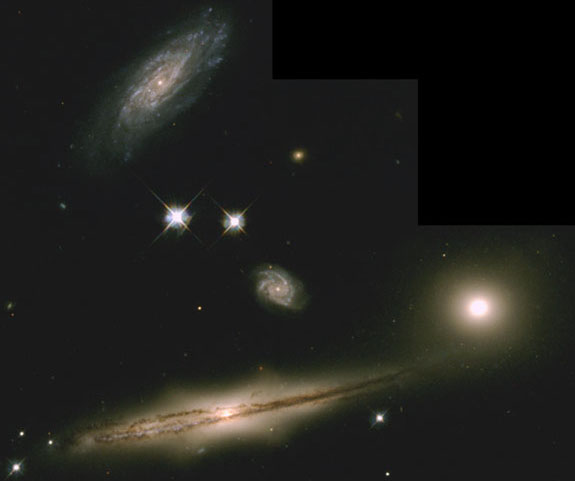
|
Credit & Copyright: Sally Hunsberger
(Lowell Obs.),
Jane Charlton
(Penn State),
et al.
& the Hubble Heritage Team (AURA/ STScI/ NASA)
Explanation:
Sometimes galaxies form groups. For example, our own
Milky Way Galaxy is part of the
Local Group of Galaxies.
Small, compact groups, like Hickson Compact Group 87 (HCG 87)
shown above, are interesting partly
because they slowly self-destruct.
Indeed, the galaxies of
HCG 87 are gravitationally
stretching each other during their 100-million year
orbits around a common center.
The pulling creates colliding gas that causes bright bursts of
star formation and feeds matter into their
active galaxy centers.
HCG 87 is composed of a large
edge-on
spiral galaxy visible on the lower left, an
elliptical galaxy
visible on the lower right, and a
spiral galaxy visible near the top.
The small spiral near the center might be far in the distance.
Several stars from
our Galaxy are also visible in the foreground.
The above picture was taken in July by the
Hubble Space Telescope's
Wide Field Planetary Camera 2.
Studying groups like HCG 87 allows insight into how all
galaxies form and evolve.
& the Hubble Heritage Team (AURA/ STScI/ NASA)
|
January February March April May June July August September October November December |
| ||||||||||||||||||||||||||||||||||||||||||||||||
NASA Web Site Statements, Warnings, and Disclaimers
NASA Official: Jay Norris. Specific rights apply.
A service of: LHEA at NASA / GSFC
& Michigan Tech. U.
Based on Astronomy Picture
Of the Day
